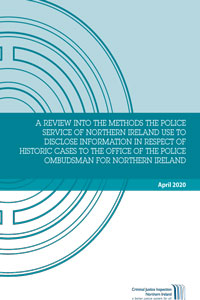A review into the methods the Police Service of N.I. use to disclose information in respect of historic cases to The Office of the Police Ombudsman for N.I.
Publication: 02/04/20

Review finds effective working relationship between PSNI and Police Ombudsman’s Office ‘critical’ to disclosure arrangements
The Chief Inspector of Criminal Justice in Northern Ireland, Jacqui Durkin has called on the Police Service of Northern Ireland (PSNI) and the Office of the Police Ombudsman for Northern Ireland (OPONI) to “work hard together” to strengthen trust and repair damage to public confidence, following the PSNI’s failure to disclose sensitive information linked to an historic case in late 2018.
Ms Durkin said it was critical effective working arrangements were in place between the two organisations, as she published the findings of a Criminal Justice Inspection Northern Ireland (CJI) review into the how the police disclose sensitive information to the Police Ombudsman’s office in Troubles-related cases.
“Inspectors found substantial work was already underway within the PSNI to address issues that contributed to the initial police failure to provide all relevant material to the Ombudsman’s office, when fieldwork for this review began in spring 2019.
“Staffing increases and the transfer of information from out-dated computer systems to modern IT platforms with better search capability are welcome developments. However, further work is needed by both organisations to establish more effective systems and better processes,” said the Chief Inspector.
“The current Memorandum of Understanding (MoU) governing the working relationship between the PSNI and OPONI should be revised and I understand this is being progressed. The OPONI and PSNI must ensure their MoU provides clarity on their respective obligations and enables an effective working relationship.
“I have recommended the procedure for requesting and responding to disclosure is examined within 12 months to allow the PSNI to better plan for, and resource, OPONI historic investigations
Ms Durkin said that practical steps were also needed at an operational level.
The PSNI’s OPONI Liaison Office (Liaison Office) was identified as the primary contact point for the OPONI, with officers within the Liaison Office carrying out searches for sensitive material following an OPONI request.
“While all Liaison Office staff had previous experience working in the PSNI’s Crime Operations Department, they did not have a thorough understanding of what the Liaison Office role involved prior to their appointment,” said the Chief Inspector.
“At the time of fieldwork, no role-specific training or guidance was provided to officers on appointment to the Liaison Office concerning searching for the required material, and each person had a workload of 15-20 OPONI cases.
She continued: “Following the inspection fieldwork, Liaison Office staffing levels have increased and a search guide has been developed to assist with and standardise the search process.
“However, I recommend the PSNI review its internal processes for appointing and training Liaison Office staff to perform this role and that staffing levels should be reviewed within 12 months against the current and potential future demand,” she said.
Ms Durkin said the police needed to carry out a full audit of its historical records to establish what material it had and where it was located, as the review found there was no central inventory of hard copy historical material. This was particularly important as material at risk of deterioration needed to be identified.
Inspectors also made recommendations where improvements were required within the OPONI.
“I have recommended the OPONI procedures for viewing and reporting the material disclosed by the PSNI should be reviewed to provide corporate assurance all material relevant to the investigation was identified and captured.
The Chief Inspector also said work needed to be done to clarify the position around providing OPONI staff with unfettered access to PSNI legacy systems.
She continued: “I have thought carefully about publishing this report today given the current public health crisis and challenges for everyone, including the PSNI and the OPONI. However, it is important to make the findings of this independent review public in a timely manner and maintain a focus on the future.
“Trust, respect and confidence are won and lost by actions, behaviours and attitudes displayed on a daily basis as much as the strategic intent.
“Building and sustaining an effective working relationship should be a key strategic priority for the Chief Constable and the Police Ombudsman.
“Getting this right is vital for public confidence,” Ms Durkin concluded.